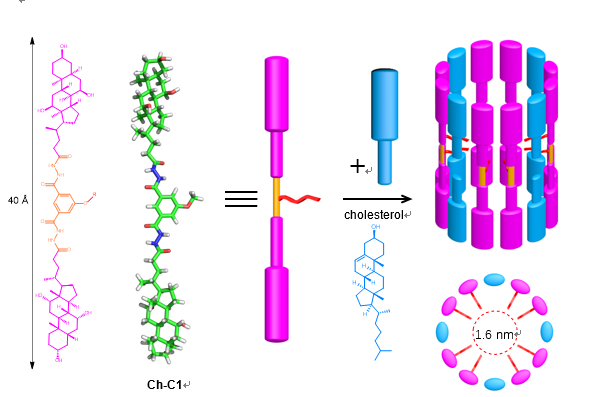Prof. Changliang Ren’s group in School of Pharmaceutical Sciences, Xiamen University (XMU-SPS), in collaboration with Prof. Huaqiang Zeng’s group in College of Chemistry, Fuzhou University, has recently published an exciting research report entitled “Cholesterol-stabilized membrane-active nanopores with anticancer activities” in Nature Communications. This work represents the first report on cholesterol-stabilized synthetic nanopores, which exhibit excellent transmembrane activities and specific anticancer activities.

In details, cholesterol-enhanced pore formation is one evolutionary approach, which could be utilized by cholesterol-free bacterial cells for specific targeting towards cholesterol-rich eukaryotic cells. By taking the advantage of this unique design, bacterial cells could escape the harmful effect of toxin due to these membrane-lytic pores. Inspired by this natural finding, the authors designed and synthesized a novel class of artificial cholesterol-dependent nanopores, with tunable nanopore formation ability by cholesterol amounts, while the optimal amount of cholesterol is 50 mol%. The high modularity in the amphiphilic molecular backbone enables a facile tuning of pore size as well as channel activity. Possessing a nano-sized cavity of 1.6 nm in diameter, the most active channel Ch-C1 can transport nanometer-sized molecules and display potent anticancer activity (IC50 = 3.8 µM) toward human hepatocellular carcinomas, with high selectivity index values of 12.5 and >130 against normal human liver and kidney cells, respectively.
This work was supported by the National Natural Science Foundation of China (22001221, 81971724 and U1903119), Shenzhen Science and Innovation Committee (JCYJ20210324123411030 and 2021Szuvp067), the Fundamental Research Funds for the Central Universities (20720210101) and Fuzhou University. Prof. Changliang Ren at Xiamen University, and Prof. Huaqiang Zeng at Fuzhou University are the co-corresponding authors for this report. The authors would also like to thank the helps from Profs. Zhen Wu, Caisheng Wu and Yun-Long Wu’s group in XMU-SPS.
Link: https://www.nature.com/articles/s41467-022-33639-5